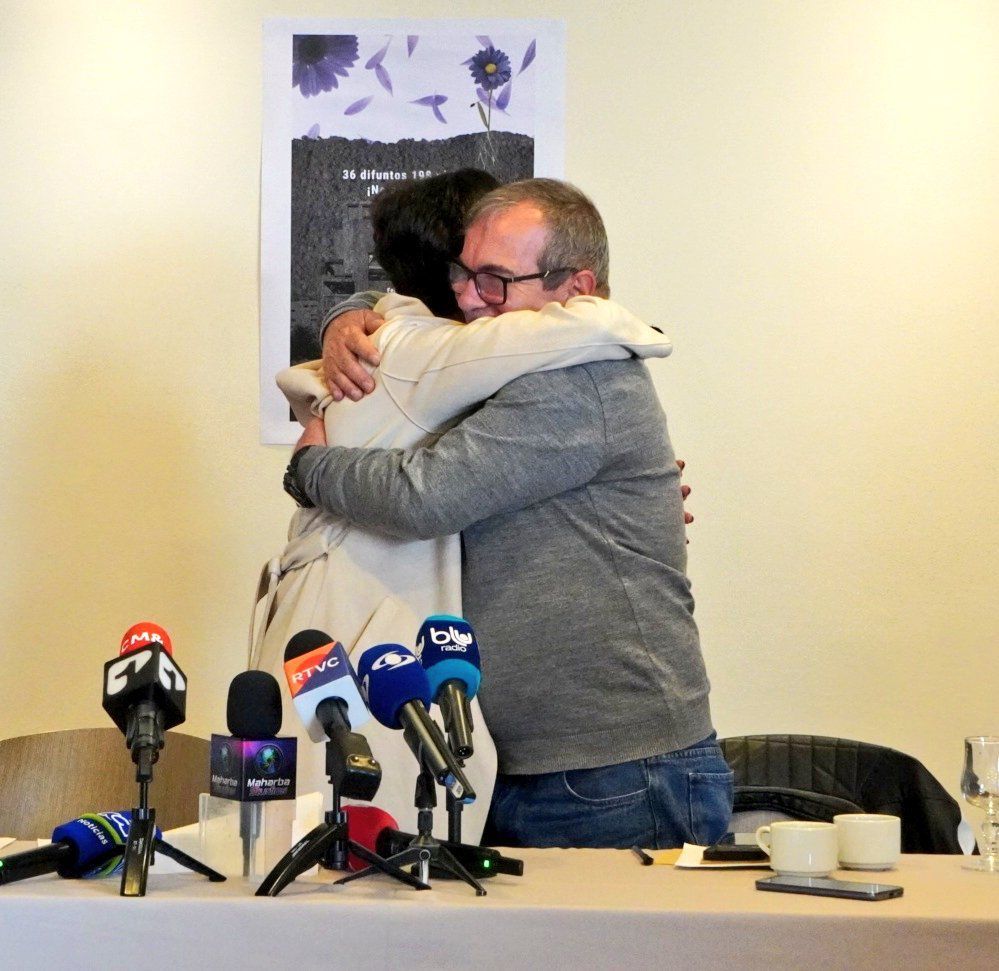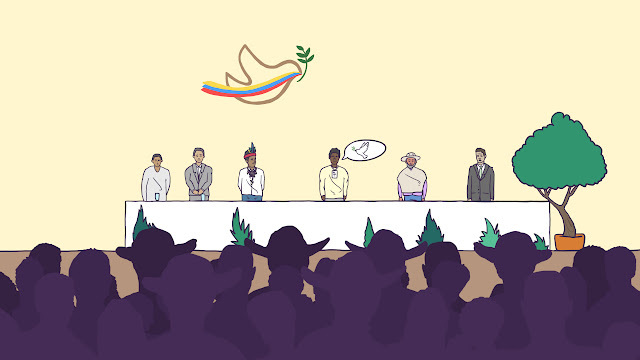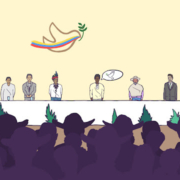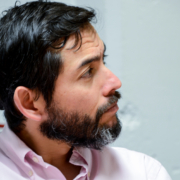Can Colombia leap forward toward reconciliation? Andrei Gómez-Suárez analyses the reconciliation encounter between Bertha Fries and Rodrigo Londoño and suggests that the political mobilisation of civil society is necessary for a breakthrough.
February 2022 was a bittersweet month for national reconciliation in Colombia. Despite the reconciliation encounter between Bertha Lucia Fries – a victim of a terrorist attack by the FARC on the El Nogal social club in Bogota in February 2003 – and Rodrigo Londoño – the FARC’s final commander in chief before the group disarmed in 2017 – on the 7th of February, the killing of former FARC members and social leaders and the attacks to the Colombian Truth Commission reveal multiple violent strategies in the ongoing armed conflict.
The Fries-Londoño encounter shows that reconciliation is possible; reconciliation understood, as political theorist Andrew Schapp suggests, as a process that constitutes a new relationship in which it is possible to imagine a “we-yet to be” between victims and perpetrators, enabled by the latter’s acknowledgement of responsibilities for wrongdoings of the past and their commitment to never again resort to violence. But the constitution of a “we-yet to be” is full of tensions – agonism is the essence of political reconciliation.

The act of political reconciliation between Bertha and Rodrigo was not just a dialogue between a victim and a perpetrator. Journalists asked tough questions, representing the uneasiness of various sectors of Colombian society, such as why haven’t the FARC handed over their resources for making reparations to victims of the conflict? Fries and Londoño’s responses focused on the FARC’s commitments with the victims of El Nogal, namely, to tell the truth about the motivations of the attack, to unveil the details of how the attack was carried out, and to participate in transformative encounters with victims. The fulfilment of these commitments, according to Bertha, shows that former FARC members can be trusted.
Trust is essential for imagining a “we-yet to be”, but a single encounter such as this, however, powerful, is not enough to achieve national reconciliation in Colombia. Reconciliation does not depend on two people, it requires a government committed to carrying out the structural transformations to remove the factors that underlie the war, to promoting ways of dealing with the past and seeking to understand the drivers, patterns and impacts of political violence, to designing and implementing a policy to recalibrate the relationship between state and society and strengthen social cohesion.
This kind of deep reconciliatory project is not easy, and it needs broader transnational strategies. On 23 February, Rodeemos el Diálogo (Embrace Dialogue, ReD) teamed up with Positive Negatives – a British non-profit making comics, animations and learning resources out of real stories of human rights violations – and IntyGrillos – a Colombian art collective based in the conflict-torn region of Putumayo – to launch an animation about implementation of the 2016 peace agreement between the government and the FARC, in particular those aspects related to eradication of illicit coca crops and tackling the drug-trafficking which has fuelled the war for decades. Based on research carried out by the National University of Colombia and SOAS, Colombia’s Broken Peace shows in 10 minutes the failure of the Duque administration to implement the agreement in Nariño, in the Southern Pacific Coast.

The lack of security guarantees for former FARC members and social leaders and the deadlock over the agreed voluntary coca crop substitution plans show how the state has abandoned communities in this region. For this reason, it is impossible for them to think that reconciliation is possible. Unfortunately, this situation is not restricted to Nariño. The killings of social leaders Teófilo Acuña and Jorge Tafur and former FARC member Jorge Santofimio in the last week of February 2022 show the seriousness of the crisis, only a month after the Constitutional Court issued an emblematic ruling declaring that the Colombian state was not fulfilling the Constitution by not implementing the peace agreement, in particular the security guarantees to former FARC combatants.
As I wrote in a previous analysis piece, the Court’s ruling is a light of hope for those seeking to defend peace, but it is not enough: the political and social mobilisation of civil society is necessary and urgent, as the attacks are not restricted to social leaders and communities, but are also directed against the transitional justice institutions created by the peace agreement. This is evident in the decision by the police to interrupt and discontinue an interview that a Commissioner of the Truth Commission was carrying out in the police headquarters with paramilitary commander-in-chief Dario Antonio Úsuga David, alias Otoniel, captured by the armed forces last year, and the robbery of the recorders used for this interview a few days later.
The members of the Advisory Board of the Truth Commission have requested an urgent meeting with President Duque to discuss the need to protect the Commission’s work. The lack of guarantees for Otoniel to offer his testimony to the Commission does not only go against the rights of the victims of paramilitary groups in Colombia, but it is also an obstacle for national reconciliation. The decision of the Advisory Board is another action showing that reconciliation is possible but that it is full of tensions because it takes place in the political arena.
Political reconciliation is a bumpy, bittersweet journey, and needs committed actors, such as Bertha Fries and Rodrigo Londoño, art collectives such as IntyGrillos, transnational networks such as Rodeemos el Diálogo, influential high-level figures such as the members of the Advisory Board of the Truth Commission, and a broad spectrum of social organisations ready to give up the fear of change and take the risk of electing politicians committed to peacebuilding. The urgent task now is to make change happen on 13 March 2022, when parliamentary elections take place. In the next analysis piece, I will discuss whether the elections represent a breakthrough for reconciliation in Colombia.





Blessings and peace be with you Bertha Fries and Rodrigo Londoño, You are both incredibly brave. You are following in the footsteps of Christ by coming to terms with loving and praying for your enemies.
Jesus died for us, he must love each and everyone of us as he loves himself. If we have enemies, they are not the enemies of Jesus.
The conflict in Columbia has gone on for three generations, it should not be passed forwards to the next generation of children and grandchildren. We cannot live in peace, unless our enemies can also live in peace.
It would be wonderful if church communities could first pray for their enemies. Then they could invite their enemies to came and pray with them, to pray for each other and to pray for healing. (with food after)
Too much injustice has happened, true justice can never happen here on Earth. Forgiveness, mercy and reconciliation have to be the way forward in order for the children and grandchildren on all sides of the conflict to live in peace.
Bertha Fries and Rodrigo Londoño you are both a shining example, your way has to be the best way forwards.
May God bless you both in your struggle for peace.